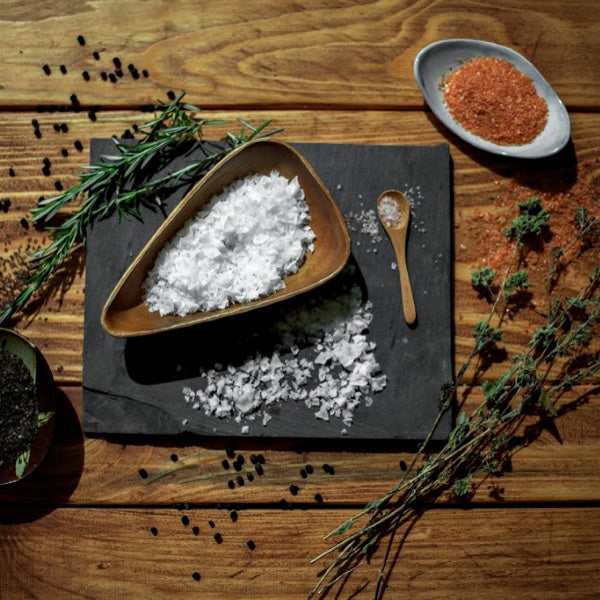Photographs courtesy of Syracuse Salt
Salt has been with us a long time, and, while it’s tempting to think of it as a simple and humble seasoning, it is actually anything but.
Salt was used by Egyptians in religious offerings and in trade with the Phoenicians as far back as 6050 B.C., and was so highly valued, its production was closely monitored in a bid to prevent waste and maintain purity. In ancient cultures, salt served as not only a staple in kitchens, but a form of currency and an essential link between nations. By the time recorded history began in 2700 B.C., the use of salt had been spread across much of the globe, thanks to nomads and burgeoning trade routes.
In addition to its cultural significance, salt is an essential part of the diet of humans, animals, and even some plants; it is one of the cheapest and easiest ways to preserve food and protect against pathogens.
But as any food geek worth their salt will tell you, this seemingly straight-forward seasoning can come in many guises. There’s table salt, kosher salt, sea salt, pink Himalayan salt...and so many others. It would be easy to turn a love of salt into a life and career-consuming obsession. And in fact, that’s just what happened to father and daughter duo David Iannicello and Elizabeth “Libby” Croom. Curious to learn more about their family business Syracuse Salt Company? Read on for insight.
NEW YORK MAKERS: You both love cooking and baking. When did you discover the importance of salt and how distinct and special it can be?
LIBBY CROOM: We both grew up cooking and baking. My dad's mother and my grandmother could always be found in the kitchen, usually cooking up a big Italian meal or Italian cookies, so of course the whole family spent a lot of time there. And my dad, my brother Max, various cousins, and I would often visit my uncle’s restaurant in Syracuse and hang out in the kitchen watching everything behind the scenes. My dad always loved to “play around” in the kitchen, pulling together any ingredients laying around to create a wonderful meal. I inherited his and my family’s love of food and through that, I learned how to season correctly, and how just a tiny amount of something could have a huge impact on a dish. This is especially true for salt. After tasting different types of salt, as any chef can tell you, each has its own flavor profile which can drastically change depending on how you use it.

Shop Syracuse Salt Company products >>
NYM: When was the company first launched and how did you go about doing it?
DAVID IANNICELLO: Libby went to Maine on her honeymoon with her husband in 2015, and brought back some sea salt from there for me, knowing how I like to experiment in the kitchen and knowing I would appreciate it. After talking about it, we realized that we live in the Salt City, so why do we not have anything like what we found in Maine here in Syracuse? I have always loved working with Mother Nature, and both of us have entrepreneurial spirits, so the small idea snowballed from there. I have the science background, and Libby has the communications background, so the two skill sets meshed nicely for the idea. We reached out to other small local businesses we had connections with, and picked their brains trying to figure out how to get it off the ground. Syracuse and Central New York has a growing and collaborative small local business community, so everyone we spoke with was super helpful and supportive. From there, we enlisted family and friends to give us opinions on things along the way, to see what would work and what wouldn’t, and just took off.

NYM: Were you nervous to work together as a father and daughter? Would you consider recruiting other family members?
LC: We weren’t particularly nervous, although it has definitely been a learning process for both of us. We both knew how each other’s brain worked, which definitely made the process smoother, and balanced each other out. As an example, early on and still to this day, my dad will approach me with a broad idea, and I’ll ruminate on it for a bit and come back to him with how we can actually execute that bigger idea into something realistic and practicable. We actually rely heavily on our family members, especially as the company has evolved and grown. We can genuinely say that it truly is a family business, as everyone — from each of their partners to my dad's parents and siblings, to Libby's brother and cousins — have stepped in at some point to help out with whatever needs to be done. Our family is also our informal focus group. They give us opinions — whether asked for or not — on the products, the marketing, and different events we do. They are truly the support system of the business, and we couldn’t do what we do without them.

From left to right: Libby Croom and David Iannicello
NYM: Can you tell me about your process of making salt?
LC: The brine comes from the deep waters flowing below the ground from the south of Syracuse, dissolving salt along the way as it has for thousands of years. In order to produce this beautiful flake, we evaporate the water slowly, leaving behind a pure, snow white flake loaded with minerals. It is then hand-sifted to a uniform size and hand-packed for use as a finishing or ingredient salt. As an added benefit, because the salt comes from a well, there is no risk of microplastics as with some sea salts. Right now, we are using solar evaporation when we can. Living in Syracuse, where we are known to have a hefty winter, this is not always possible, but during the warmer months we try to use solar evaporation as often as possible. In the (hopefully near) future, we plan to be fully solar for the entire process.


NYM: How much has the company grown and how has it developed?
LC: Our ultimate goal was always to produce salt locally from a well right here in Syracuse, which, of course, is also known as “the Salt City” because of its history as the leading producer of salt in the country over 200 years ago. That industry faded away over time, and we knew there had to be a way to bring it back. In order to get to that point, however, we needed to start smaller. We began the business with flavored sea salts and Himalayan salt products, some of which were produced for us, and some of which we infused ourselves. From there, we worked with local chefs on new ideas for flavors, and just generally experimented on what worked and what didn’t. After a few years of this and a huge rebranding, we were able to start on the dream of harvesting our own. We started with the Department of Transportation’s pre-existing well, because we wanted to test the brine to see if the salinity was high enough to produce a product, and that that product was safe. We then worked with local government and a geologist, and eventually came to where we are now, having a dedicated space and a dedicated well to pull the brine from. We are also now transitioning all of our flavor infused salts to only be made with our Salt City Flake, as we have named it.

NYM: Are there any salts you wouldn’t consider cooking with?
DI: We both like to stay away from the generic table salt you’d find on the shelves of any grocery store. This iodized salt is so processed that all of the good stuff you’d get in a natural salt is taken out, and all that’s left is the sodium and artificial fillers. When working with other varieties of salts, you are getting the added benefit of the naturally occurring minerals, and with that, varying tastes and health benefits. There’s simply no reason to use this salt if you have access to better quality, mineral-rich natural salt.
NYM: What do you wish people knew about salt? Or what are some common misconceptions?
DI: There are two big misconceptions we battle, and education on these is a large part of the business. The first is that salt is bad for you. This is inherently untrue, as your body needs salt to survive. The generic iodized salt may not be good for you, but sea salts and locally produced salts have loads of minerals that can actually be good for you in different ways. Additionally, many sea salts have iodine naturally occurring in them, so the idea that you have to buy specifically iodized salt is erroneous. Most people today are also getting enough iodine in their diet through fish and vegetables that extra iodine is not necessary. The second misconception is that the salt we produce from Syracuse is from Onondaga Lake, which has a history of being polluted. The salt actually comes from a brine well over 280 feet below ground, well below the depth of the lake. The water is pulled from an ancient underground source that flows up from the south, so the brine we are pulling has not even reached Onondaga lake yet. We have had it tested and it is beautifully clean and pure, as many local professional (and at-home) chefs can attest.
NYM: Can you share your favorite ways to use some of your more esoteric salts?
LC: One of our favorite salts is actually our Lemon Rose Flake salt, which we get many questions about regarding how to use it. This one is good on salads and vegetables, and we particularly like it on pies and sweets. It's earthy and tangy, and has been known to be great as a rub on chicken. Ginger is also one that people ask about a lot, and our favorite thing to do with that one is to use it on roasted vegetables, such as sweet potatoes, or even fish. The one thing we always tell people, though, is that once you try them, you'll have an idea of the flavor profile, and that will make it easier to tune it to your own taste preferences. For example, some people may prefer the smoked salt as a rub on meats, whereas others think the best thing for it is to go on a caprese salad. We encourage everyone to play around with them and love to hear when one of our customers tries something new and inventive with them.
Shop Syracuse Salt Company products >>



Leave a comment